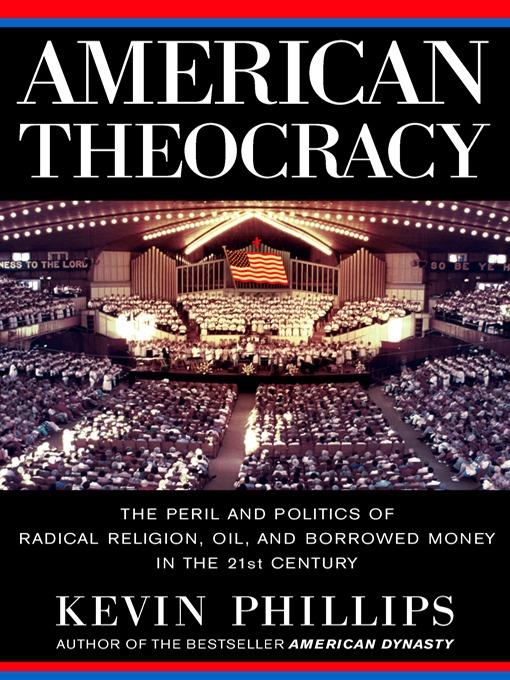
American Theocracy
The Peril and Politics of Radical Religion, Oil, and Borrowed Money in the 21st
کتاب های مرتبط
- اطلاعات
- نقد و بررسی
- دیدگاه کاربران
نقد و بررسی

February 13, 2006
The title of political analyst Phillips's latest book may overstate his case (in the text, he prefers the term "theocratic direction"), but his analysis likely will strike chords among those troubled by our current political moment. Phillips (American Dynasty
) expounds upon historical parallels for each of his three subjects. In his section on "Oil and American Supremacy," for example, he points to Britain's post-WWI involvement in the Middle East as an analogy to Iraq, and in his section on radicalized religion, he warns of "the pitfalls of imperial Christian overreach from Rome to Britain." The five major measures of U.S. debt—from national to household—keep setting records, he observes in his section on "Borrowed Prosperity," and the real estate boom spurred by the Federal Reserve, he argues, cannot continue. Phillips identifies the escalating clout of the financial services industry and suggests that Americans should emulate policies in Asia that encourage savings and in Europe that encourage manufacturing. The lesson of the past, he warns, is that intractable national issues "generate weak and compromising politicians or zealous bumblers." A critic of the Bush family, Phillips sees little hope in Hillary Clinton. Expect him to make some provocative appearances on chat shows.

March 15, 2006
When Phillips wrote "The Emerging Republican Majority" almost 40 years ago, he correctly forecasted the electoral landscape of the United States for a generation and has ever since been among our most prominent political commentators. Now, however, in the latest of his many books, Phillips finds that the party he once served as strategist has become -a fusion of petroleum-defined national security; a crusading, simplistic Christianity; and a reckless credit-feeding financial complex. - While some points made here overlap with points Phillips has already made elsewhere, e.g., in "American Dynasty", his broadside against the Bush family, the most original part of this new book is his analysis of the -southernization - of American politics, an important component of his case here on oil and religion. If Phillips -s political allegiance has changed over the decades, the sharpness of his observations and the historical depth and range of his arguments -as well as the wit and style gracing them -have not. His warning of an -Emerging Republican Theocracy - is sure to capture media attention and draw many readers. For all libraries. [See Prepub Alert, "LJ" 11/15/05.]" - Robert F. Nardini, Chichester, NH"
Copyright 2006 Library Journal, LLC Used with permission.

March 1, 2006
This former Republican strategist has written several books on the relationship between wealth and politics in this country, including the " New York Times" best-sellers " Politics of Rich and Poor" (1990) and " Wealth and Democracy" (2002). Phillips' abiding theme is given a workout again in his new book, with his major thesis spelled out on the first page of the preface: three demons threaten the continued well-being of the U.S. These are our "reckless dependency on shrinking oil supplies," a "milieu of radicalized (and much too influential) religion," and a "reliance on borrowed money" (domestic and international debt, that is). His stiff--no harsh--words are aimed primarily at the Republican Party for allowing these three trends to have gotten out of control, but Democrats, without offering clear and tangible alternatives, are not let off the hook. The author's investigation into these three problems is set in a historical context as he posits the undeniable fact that all previous world economic powers have ultimately failed in continued strength (each one, however, believing "they were unique and that God was on their side"). Phillips is eloquent, absorbing, and frightening, and this book will follow its predecessors onto the best-seller lists. (Reprinted with permission of Booklist, copyright 2006, American Library Association.)

























دیدگاه کاربران